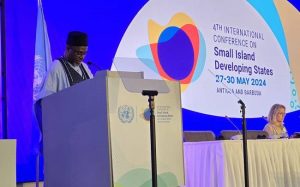Nigeria has said that it stands in solidarity with Small Island Developing States (SIDS) and is committed to contributing to global efforts aimed at mitigating climate impacts and promoting sustainable development.

In a speech delivered on Wednesday, May 29, 2024, in Antigua and Barbados during the 4th United Nations International Conference on Small Island Developing States (UN SIDS4), President Bola Tinubu lamented that SIDS are at the frontline of global environmental crisis due to climate change and other factors such as pollution and loss of biodiversity.
“Despite contributing less than one 1% percent of global greenhouse gas emissions, these nations suffer disproportionately from the impacts of climate change resulting to rising sea levels, increased frequency of extreme weather events, and the degradation of marine ecosystems,” said Tinubu, who was represented by Balarabe Abbas Lawal, the Minister of Environment.
According to Tinubu, these factors pose existential threats to the livelihoods and cultures of millions of people in this region, adding that innovative adaptation strategies as well as robust international support and partnerships are essential to enhance and build resilience in the vulnerable islands.
While expressing Nigeria‘s commitment to working with SIDS and other nations to facilitate knowledge exchange and capacity-building initiatives, noted that, despite challenges faced by SIDS, they also have opportunities to move towards a green economy as, according to him, “they possess both unexploited terrestrial and oceanic natural resources such as fish stocks, minerals, potential pharmaceutical products, renewable energy such as wind, sun, ocean, wave, hydro and geothermal”.
He expressed belief that, if harnessed properly, SIDS have the potentials to take a lead in defining models of sustainability and human well-being whilst moving towards a Green Economy.
He disclosed that the Nigerian Government addressed environmental issues such as pollution and flooding in a major island in Lagos State by establishing and empowering Government Ministries and Agencies that are related to environment to implement robust waste management programmes.
His words: “The challenges faced by small island developing states are a reflection of broader global issues that require collective action. By supporting SIDS, we are also advancing the broader agenda of sustainable development and environmental stewardship. We must collaborate with SIDS and prioritise investments in climate resilience infrastructure which includes building sea defenses, developing early warning systems, and implementing sustainable land and water management practices.
“Collaboration with international financial institutions and the private sector is essential to mobilise the necessary resources. The economic vulnerabilities of SIDS are exacerbated by their heavy reliance on tourism and external markets. Diversifying their economies through the promotion of sustainable industries, such as renewable energy, fisheries, and agriculture, can create more resilient economic structures.
“Access to concessional financing is critical for SIDS to address their development challenges. We must advocate for tailored financial mechanisms that recognize the unique circumstances of SIDS and provide them with the fiscal space needed to invest in sustainable development and create more climate resilient environment.
“Strengthening regional cooperation among SIDS and fostering partnerships with larger economies can drive innovative solutions and share best practices.”
The President reaffirmed the nation’s commitment to the principles of equity, justice, and shared prosperity.
“The lands, water and air all belong to humanity and together, we can chart a course toward a more resilient and sustainable environment for our future and generations to come,” he said.
UN SIDS4, which commenced on Monday, May 27, will come to a close on Thursday, May 30.
